Description of DIESEL¶
Here, we give a brief summary of DIESEL. More detailed information will be given later, in the various parts of the lab assignment. As DIESEL has much in common with Pascal and Modula-2, we will make use of them and point out differences from them, particularly when there is ambiguity.
Declarations¶
A program in DIESEL starts just as in Pascal, but you can not write file specifications such as (input, output) .
Declaring constants¶

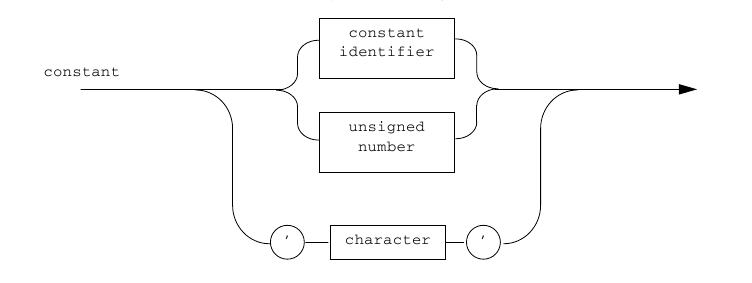
Constant definitions such as:
const
SIZE = 10;
PI = 3.14159;
BUF_MAX = SIZE;
give names to numbers. Note the distinction between the number
10 and the constant SIZE. Both are of integer type.
Furthermore, string constants can be declared in DIESEL but you are not allowed to use them 1:
const
version = 'version 1.1';
Unlike Pascal, numerical constants can only have non-negative values:
Declaring Variables¶


DIESEL has no mechanism for creating new types and thus has no type–
construction. This, and also the absence of records and pointers, is the
main weakness of DIESEL. boolean and char do not exist either,
but fortunately integer and real do. Variables can be declared
as one of the simple types or an array of these:
var
i : integer;
a : array[10] of real;
Note that you cannot write:
var
i, j : integer; { wrong! }
Only one-dimensional arrays exist. These are indexed by integers. In the
example above the index can vary between 0 and 9 (i.e.
there are 10 elements). The operations allowed on arrays are
assignment and reference of elements. Arrays cannot be used as
parameters to procedures or functions.
Boolean values are simulated by integers where 0 represents
false and everything else true.
Declaring functions and procedures¶
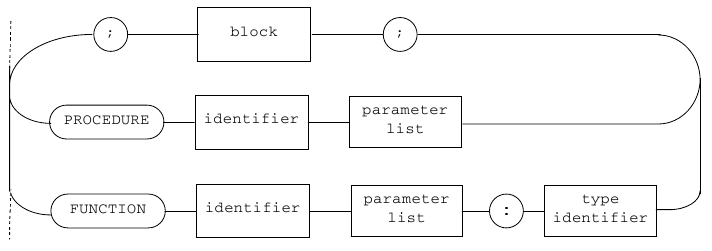

DIESEL provides both functions and procedures. These can be nested arbitrarily and they can be recursive. As there is no forward construction, mutual recursion is a little more difficult, but can be achieved by placing one function or procedure inside another.
Functions can return values of the integer or real types whereas procedures do not return a value. It is possible to send expressions of the integer or real types as actual parameters. These are bound to the formal parameters according to the call-by-value principle, i.e. the called function or procedure can not modify the values of the actual parameters.
The same restriction applies here as to the declaration of variables; the following is wrong:
procedure p(i, j : integer; x, y : real); {wrong!}
and should be written as:
procedure p(i : integer; j : integer; x : real; y : real);
Finally, after all the declarations, we come to the main program:

Statements¶
Assignments¶
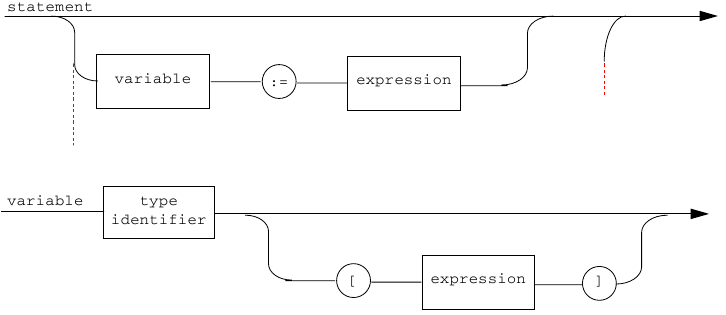
You can assign values to variables, and to elements in an array.
Type conflicts arise if the variable is of the integer type but the expression results in a floating-point number. However, type conversion is carried out in the following assignment:
var
x : real;
begin
x := 3;
end;
This is the same rule as in Pascal.
Procedure calls¶

Calling a procedure is carried out in the same way as in Pascal with one important exception: the parentheses must always be written out. The same applies to functions.
There is a pre-defined procedure, write, which takes an argument (integer) interpreted as ASCII and prints it on the screen. For example,
write(48);
prints a zero. Procedures for writing integers and floating-point numbers are written in the language and can be found in the appendix.
Conditionals¶
DIESEL uses the same syntax for conditional statements as Modula-2:
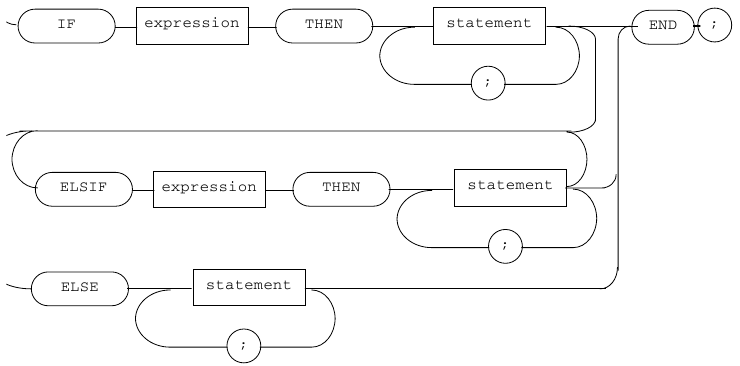
DIESEL |
PASCAL |
|---|---|
if a > b then
c := d;
end;
|
if a > b then
c := d;
|
if a > b then
c := d;
e:= f;
else
g := h;
end;
|
if a > b then
begin
c := d;
e := f;
end
else
g := h;
|
if a > b then
c := d;
e := f;
elsif g > h then
i := j;
k := l;
elsif m > n then
o := p;
else
q := r;
s := t;
end;
|
if a > b then
begin
c := d;
e := f;
end
else if g > h then
begin
i := j;
k := l;
end
else if m > n then
o := p;
else
begin
q := r;
s := t;
end;
|
Repetition¶
The only repetition statement in DIESEL is while:

Note that the while-statement, like the if-statement, always finishes with an end without an introductory begin.
Examples:
DIESEL |
PASCAL |
|---|---|
while a > b do
c := d;
end;
|
while a > b do
c := d;
|
while a > b do
c := d;
e := f;
end;
|
while a > b do
begin
c := d;
e := f;
end;
|
Return¶
In Pascal a function gets its value from an assignment statement where the function name appears on the left-hand side. In contrast DIESEL has borrowed the return-statement from Modula-2 which achieves the same thing.

Executing a return-statement means that the function is assigned the value given by the expression; then the return is performed immediately. The expression’s type must be assignment compatible with the declared function name. Example:
function max(a : integer; b : integer) : integer;
begin
if a > b then
return a;
else
return b;
end
end;
In an ordinary procedure you can have return-statements without a following expression. Such return-statements act as alternative return points in the procedure. Example:
procedure down(n : integer);
begin
if n = 0 then
return ;
else
down(n-1);
write_int(n);
newline();
end;
end;
Arithmetic expressions¶
Factors¶





A factor in an arithmetic expression can be a number or a constant, a variable, the value of a function (note the obligatory parentheses), an expression in parentheses, or a logical negation.
There are two standard functions that deal with arithmetics:
readtakes no arguments but returns the next input character as an integer (ASCII). Example:var i : integer; begin i := read(); end;
trunctransforms floating-point numbers to integers by truncation. Example:var i : integer; begin i := trunc(3.7); end;
which assigns the value
3toi.
Terms¶
Terms can be built from factors:

Note that DIV is an integer operation and is defined only for integer
arguments. Also note that / always returns a floating-point result,
even if it is used with integer arguments. Boolean numbers are integer
values and therefore boolean operations only accept integer operands.
Their results should be either 1 (true) or 0
(false).
Simple expression¶
Simple expressions are built out of terms:
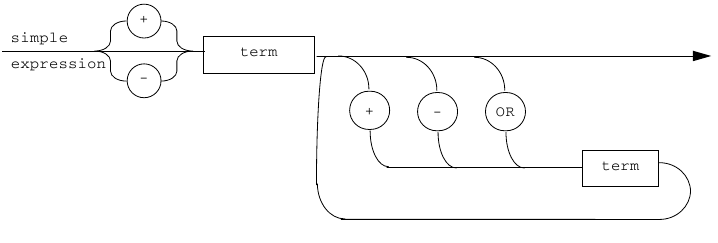
Expressions¶
Finally, an arithmetic expression can be either a simple expression
or a logical comparison of two simple expressions. In the latter case
the result will be an integer value of 1 or 0.
Note that <= and >= do not exist.

stdio.d¶
Listing of some standard I/O functions in DIESEL.
1 2 3 4 5 6 7 8 9 10 11 12 13 14 15 16 17 18 19 20 21 22 23 24 25 26 27 28 29 30 31 32 33 34 35 36 37 38 39 40 41 42 43 44 45 46 47 48 49 50 51 52 53 54 55 56 57 58 59 60 61 62 63 64 65 66 67 68 69 70 71 72 73 74 75 76 77 78 79 80 81 82 83 84 85 86 87 88 89 90 91 92 93 94 95 96 97 98 99 100 101 102 103 104 105 106 107 108 109 110 111 112 113 114 115 116 117 118 119 | { ******************************* } { * * } { * Standard I/O primitives * } { * * } { ******************************* } procedure newline; const NEWLINE = 10; begin write(NEWLINE); end; procedure write_int(val : integer); const ASCII0 = 48; { ascii value of '0' } MINUS = 45; var c : integer; buf : array[25] of integer; { enough for 25 digits. } bufp : integer; begin if (val = 0) then write(ASCII0); return; end; if (val < 0) then write(MINUS); val := -val; end; bufp := 0; while val > 0 do c := val mod 10; buf[bufp] := c + ASCII0; bufp := bufp + 1; val := val div 10; end; while (bufp > 0) do bufp := bufp - 1; write(buf[bufp]); end; end; procedure write_real(val : real); const DOT = 46; DIGITS = 6; var i : integer; multi : integer; begin write_int(trunc(val)); write(DOT); i := 0; multi := 1; while(i < DIGITS) do i := i + 1; multi := multi * 10; { avoid precision loss as much as we can } write_int(trunc(val * multi) mod 10); end; end; function read_int : integer; const BLANK = 32; ASCII0 = 48; ASCII9 = 57; var acc : integer; c : integer; begin acc := 0; c := read(); while (c < ASCII0) or (c > ASCII9) do c := read(); end; while not ((c < ASCII0) or (c > ASCII9)) do acc := 10 * acc + c - ASCII0; c := read(); end; return acc; end; function read_real : real; const BLANK = 32; ASCII0 = 48; ASCII9 = 57; DOT = 46; var res : real; acc : integer; c : integer; begin acc := 0; c := read(); while (c < ASCII0) or (c > ASCII9) do c := read(); end; while not ((c < ASCII0) or (c > ASCII9)) do acc := 10 * acc + c - ASCII0; c := read(); end; res := acc; if (c <> DOT) then return res; end; acc := 1; c := read(); while not ((c < ASCII0) or (c > ASCII9)) do acc := 10 * acc; c := c - ASCII0; res := res + c/acc; c := read(); end; return res; end; |
- 1
The aim is to make the lexical analysis a little more interesting.